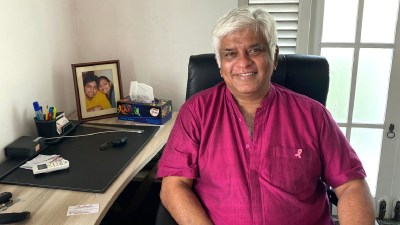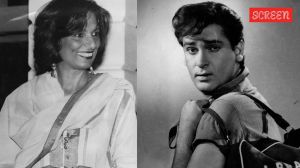Invisible Man
Much of the credit for Team Indias winning streak goes to Gary Kirsten. <B>Kunal Pradhan</B> profiles the coach who prefers to stay away from the spotlight
Hanging over the city like a benevolent uncle,its flattened peak covered with mist,Table Mountain is the guardian angel of Cape Town. Along the mountain,a road lined by little bits of historyranging from the arrival of Dutchman Jan van Riebeeck in 1652 to the first heart transplant by Dr Christiaan Barnard in 1967leads you to Newlands.
Perhaps the most scenic cricket ground in the world,Newlands has its own rich past going back to 1889,when England defeated South Africa by an innings and 202 runs. Over the years,a number of cricketers have claimed ownership of the ground because of their exploits there,but only a few could ever really call it home.
For Gary Kirsten,former South Africa cricketer and current India coach,Newlands was literally his own backyard. When Kirsten was 10,his father Noel took charge as the curator of the ground,and for eight years,the young boys life revolved around its lush outfieldbe it Currie Cup matches that he could watch from his living room,or the intense games of rugby he played with his brothers on wet off-days.
With cricket in his bloodhis older brother Peter played Tests and is perhaps best remembered for his spat with Kapil Dev after the Indian bowler ran him out for backing up too farKirsten rose up the ranks quickly enough,his battle with his early critics as successful as his fight with a receding hairline wasnt.
For 10 years,he batted in South African coloursgritty,organised and prolific,though it wouldnt be unfair to say that he had only a few ounces of the natural grace expected from left-handers.
In his autobiography,Gazza,Kirsten says he didnt regret a single day of his life in the dressing-room,except when he heard that Hansie (Cronje) was guilty (of match-fixing). And the way his time as coach of the Indian team is panning outin the same gritty,organised,prolific mannerthere is little this gentle Capetonian has had to regret since finishing his stint as a player.
Team India have had a tremendous run with Kirsten lurking in the background,staying away from the spotlight,and emerging from the shadows of his illustrious companions only at places where the cameras and the intrusive eyes of newspaper reporters have no way of reaching.
Players,his support staff,even board officials for a change,sing praises of how Kirstens influence cannot be disregarded in any analysis of why the team is on a winning spree. The role of a coach as a negative influence on a cricket team had been hotly debated during Greg Chappells time,and now the stories are about how the Kirsten model is the best example of how to make a positive impact on a unit of talented,but wildly individualistic,players.
But not surprisingly,Kirsten had some apprehensions before coming to India,especially with how dirty linen had been washed in public after the 2007 World Cup disaster. Being coach of India is considered the biggest,most difficult job in world cricket. There were a lot of peoplehis family and his friendswho told him he shouldnt even think of taking the offer, says Neil Manthorp,a leading South African cricket writer who ghosted Kirstens autobiography.
He just shrugged and said,You ask how can I do it,but how can I say no? Gary is a fantastic believer in the idiom that if youve never run a marathon,and you want to do it,you have to take it one street lamp at a time and not think of the entire distance.
He was always good at listening,at sharing advice. And he thought,Well,Ill just go over and have a chat with Sachin (Tendulkar),then have a chat with Anil (Kumble),and then have breakfast with Rahul (Dravid),and lunch,and dinner; take it one step at a time, Manthorp laughs.
Kirsten realised quickly that his first task as coach was winning the teams confidence,especially since they had just been through a very difficult period. He made an effort to learn the Indian way of doing things,finding out what was appropriate and what was not in his dealings with people. But what endeared him most to his companions in the dressing room was how he is,as Manthorp describes him,an ego-less person.
As a young player,because of his unattractive style,Kirsten was too self-conscious about his batting to develop much of an ego. Critics said he had just one shot in his armoury early on and,as if to humiliate him,Allan Border put a slip and three gullies for him on his first overseas tour to Australia. Finding it difficult to score runs,Kirsten was embarrassed at how badly hed been exposed until he was reminded about the merits of sticking it out. Its not how,its how many, he was told,and it became his mantra right through his cricketing life.
Strongly influenced by Bob Woolmer during his playing days,Kirstens coaching style is similar,encouraging players to self-analyse rather than insisting on telling them whats wrong with their technique.
If a player asks for help,even if Kirsten has spotted something,he is most likely to say,I dont know. What do you think about it? No pedantic lectures,no stressing on the importance of keeping your head still and your eyes on the ball. Discussions with him,players say,are on more equal terms in comparison with Chappell and more in-depth in comparison with John Wright.
Yusuf Pathan,who has blossomed as a one-day and Twenty20 player over the last year,illustrates this with an example. I distinctly remember my first interaction with Gary. He walked up to me at the nets and said there were only a few batsmen in the world who play strokes like I do. Hearing that from the India coach gave me immense confidence. He told me never to change my style of batting,but at the same time,asked me to play straight, Yusuf says. Not just me,he treats everyone like a star,without preferential treatment. He told Ravindra Jadeja when he saw him for the first time that he was one of the best fielders in the world. The boy was on a different plane after that.
The details may be different,but the theme is similar as we talk to other players. Wicketkeeper Parthiv Patel,who has played 20 Tests and 14 one-dayers for India over the last seven years,says never before has he felt as comfortable with any coach.
Whenever Ive gone to him,Ive come back brighter and more confident about myself. Most importantly,there is never any communication gap,no fear in discussing my problems with him, says Parthiv.
Before going to South Africa to be with his mother,he came to me to say that Id play the third Test. He told me,Trust yourself and enjoy the moment,and also mentioned that I should lean into my shots because I had the tendency to be upright. Thats the best part about him. He gives his inputs but doesnt try to ram them down your throat. Theyre just thrown up,like points to ponder,and hes almost always right.
Batsman Rohit Sharma elaborates on this trait: If he wants to convey something,he will tell you once and not harp on it. He never shouts instructions or talks about your flaws when others are around. Hell have a quiet,friendly talk in private. Its much easier to take advice that way.
When Kirsten had come to India,there was speculation that he would get rid of fielding coach Robin Singh and bowling coach Venkatesh Prasad,replacing them with his own set of people. Though Kirsten insisted on the appointment of trainer Paddy Upton,his right-hand man,he soon conveyed to Robin and Prasad that he wouldnt target them. Over time,the four principal members of the coaching staff have developed a healthy working relationship.
We sit together and plan for matches and Gary has a great rapport with us. The foremost thing for good planning is trust. He values our inputs and there are no boundaries within which we work. For example,Gary came to me one day and said,Mate I feel like giving fielding practice today,would you swap roles with me? says Robin Singh.
Just like Virender Sehwag and Gautam Gambhir dont need to call when they run a quick single,he ensures the coaching staff is always on the same page, says Robin.
Kirsten,his biographer Manthorp insists,is just being himself in all his dealings with the players and the administration,but he does point out that a new cleverness has crept into his demeanour. The story goes that Kirsten was having trouble handling the Indian team managerthey change on a rotational basison one of their overseas tours last year. Self-serving,in-your-face and officious,as some Indian cricket administrators can sometimes be,the manager even wrote against Kirsten and Upton in his tour report submitted to the BCCI. Barely a few months into his assignment,the situation was new for Kirsten. Instead of taking on the official,he made sure hed praise him at every opportunity he got after the series,thereby taking the wind out of his sails and the sting out of his criticism.
While concentrating on these daily issues (going from street lamp to street lamp,as it were) Kirsten also keeps his eye on the big picture,which is revealed from time to time in his rare media appearanceslike when he said this month that he wanted the Indian team to be No. 1 by the end of the year.
Getting to the top is our goal this year but its not consuming us, Kirsten said. We talked about what we wanted to do and my coaching style is that each guy should work on his game. We have a fair idea of what each player of the opposition does but too much analysis can be dangerous.
As a manifestation of that thinking,Kirsten asked the team not to watch videos of mystery spinner Ajantha Mendis while preparing for the Lanka series. Play him as he comes,without the baggage of analysis,he said. As it turned out,the puzzle was solved.
Its perhaps too soon to give a verdict,considering how perceptions change when a side starts losing. But like Cape Town has Table Mountain,at least the early indications are that Team India seem to have found their own benevolent unclequietly watching over them from the background.
(With inputs from Devendra Pandey in Mumbai and G.S. Vivek in New Delhi)
Photos
- 01
- 02
- 03
- 04
- 05































